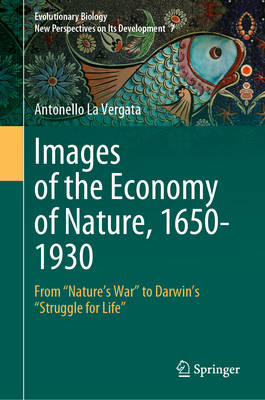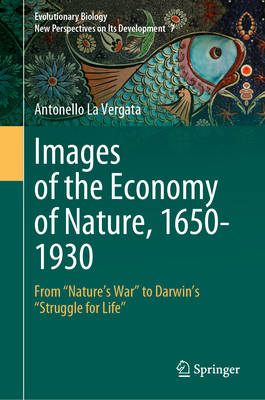
En raison d'une grêve chez bpost, votre commande pourrait être retardée. Vous avez besoin d’un livre rapidement ? Nos magasins vous accueillent à bras ouverts !
- Retrait gratuit dans votre magasin Club
- 7.000.000 titres dans notre catalogue
- Payer en toute sécurité
- Toujours un magasin près de chez vous
En raison de la grêve chez bpost, votre commande pourrait être retardée. Vous avez besoin d’un livre rapidement ? Nos magasins vous accueillent à bras ouverts !
- Retrait gratuit dans votre magasin Club
- 7.000.0000 titres dans notre catalogue
- Payer en toute sécurité
- Toujours un magasin près de chez vous
Images of the Economy of Nature, 1650-1930
From Nature's War to Darwin's Struggle for Life
Antonello La Vergata
168,95 €
+ 337 points
Format
Description
The book discusses ideas concerning the order and balance of nature (or "economy of nature") from the late 17th century to the early 20th century. The perspective taken is broad, longue durée and interdisciplinary, and reveals the interplay of scientific, philosophical, moral and social ideas. The story begins with natural theology (dating roughly to the onset of the so-called Newtonian Revolution) and ends with the First World War. The cut-off date has been chosen for the following reasons: the war changed the state of things, affecting man's way of looking at, and relating to, nature both directly and indirectly; indeed, it put an end to most applications of Darwinism to society and history, including interpretations of war as a form of the struggle for existence. The author presents an overview of the different images of nature that were involved in these debates, especially in the late 19th century, when a large part of the scientific community paid lip service to 'Darwinism', while practically each expert felt free to interpret it in his own distinct way. The book also touches on the so-called 'social Darwinism', which was neither a real theory, nor a common body of ideas, and its various views of society and nature's economy. Part of this book deals with the persistence of moralizing images of nature in the work of many authors. One of the main features of the book is its wealth of (detailed) quotations. In this way the author gives the reader the opportunity to see the original statements on which the author bases his discussion. The author privileges the analysis of different positions over a historiography offering a merely linear narrative based on general implications of ideas and theories. To revisit the concept of the so-called "Darwinian Revolution", we need to examine the various perspectives of scientists and others, their language and, so to speak, the lenses they used when reading "facts" and theories. The book ends with some general reflections on Darwin and Darwinisms (the plural is important) as a case study on the relationship between intellectual history, the history of science and contextual history.
Written by a historian, this book really gives new, multidisciplinary perspectives on the "Darwinian Revolution."
Written by a historian, this book really gives new, multidisciplinary perspectives on the "Darwinian Revolution."
Spécifications
Parties prenantes
- Auteur(s) :
- Editeur:
Contenu
- Nombre de pages :
- 616
- Langue:
- Anglais
- Collection :
- Tome:
- n° 7
Caractéristiques
- EAN:
- 9783031310225
- Date de parution :
- 07-10-23
- Format:
- Livre relié
- Format numérique:
- Genaaid
- Dimensions :
- 156 mm x 234 mm
- Poids :
- 1043 g

Les avis
Nous publions uniquement les avis qui respectent les conditions requises. Consultez nos conditions pour les avis.






